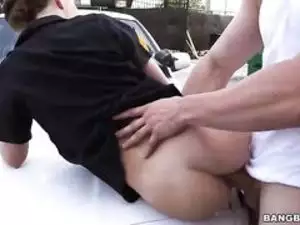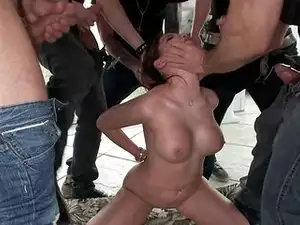Don't Sleep On The Subway Book ThreeChapter 57: Nov 1945 The Nurenberg War Crimes Trial Begins free porn video

“As I see it today, Hitler and Goebbels were in fact molded by the mob itself, guided by its yearnings and its daydreams. Of course, Goebbels and Hitler knew how to penetrate through to the instincts of their audiences; but in the deeper sense they derived their whole existence from these audiences. Certainly the masses roared to the beat set by Hitler’s and Goebbels’ baton; yet they were not the true conductors. The mob determined the theme. To compensate for misery, insecurity, unemployment, and hopelessness, this anonymous assemblage wallowed for hours at a time in obsessions, savagery and license. The personal unhappiness caused by the breakdown of the economy was replaced by a frenzy that demanded victims. By lashing out at their opponents and vilifying the Jews, they gave expression and direction to fierce primal passions.”
― Albert Speer, Inside the Third Reich
It is difficult to say if the selection of Nurenberg as the site for the post-World War Two War Crimes Trial was random or intentional, but it was the perfect location for final justice to be dealt out to the high ranking Nazis indicted for their crimes against humanity.
The city had not been bombed extensively and many of the buildings were in good shape to host the international visitors that would shape the judicial hearings against the Nazi extreme measures used in the waging of World War Two. Nurenberg, like many of the German cities of merit had an inner core that they usually called the “old town”. The people were generally split fifty/fifty in support of Hitler just like most of Germany during the war years. However, the populace was wise enough to keep silent and follow the “Alles in Ordnung” principle of obedience in taking orders. They did not want to wind up in a place as frightening as Dachau or Belsen notorious for their horrors.
Now that the war was ended and the Fuhrer was dead from suicide in his hidden bunker under the streets of Berlin, the average German on the street professed to be against him from the very beginning and in all honesty only about ten percent of the population was members of the Nazi party. The Wehrmacht was excluded from that statistic because regulations excluded them from party membership. The dreaded SS more often than not wore the symbol of Nazism more from their job description or military occupational status rather than loyalty to the Thousand Year Reich.
Many of the party members were proud holders of their identification cards right up to the end of the war when reality set in and they realized that they might have to pay a price for using their membership to get a promotion or to be appointed to some position that they otherwise could never have aspired to without party membership.
It was relatively easy for the allied investigators to find a cadre of snoops to ferret out all the dirt they needed to hang most of the high ranking Nazis they had rounded up for the trials.
The difference was that they gave the enemy the same rights as an American citizen to have a lawyer to represent them, either military or civilian and actually paid their expenses just like in the United States. They allowed character witnesses as well as introducing mitigating evidence into the record to bolster their cases. In that way, there could be no accusation that it was a Kangaroo Court or that the cards were stacked against the defendants. In a certain way, that was good for the prosecution because it kept them on their toes and made them let the facts speak for themselves by producing witness after witness that accused the monsters on trial for their crimes committing in the name of Adolph Hitler.
Wanting justice to be served properly, the court kept a suicide watch on all of the defendants to prevent them from taking the easy way out like Hitler and Eva Braun.
There was a whole series of trials to punish the war criminals after the war in Nurenberg, but the first and the most important one was the one before the International Military Tribunal (IMT) which was against the most influential Nazis still alive to receive justice.
Martin Bormann was killed in May 1945 and was tried in absentia.
Hitler and Goebbels committed suicide in the bunker in Berlin.
Adolph Eichmann fled to Argentina and was eventually captured by the Israeli Mossad and was executed in 1962.
Hermann Goring evaded justice by committing suicide in his cell before the end of the trial.
It is important to mention that count three against the defendants was “genocide”. It was described as the intentional extermination of Poles, Gypsies and Jews as well as other segments of society deemed unsuitable for the Third Reich.
At the same time, the allies stated specifically that they would punish the Nazis responsible for genocide at the Yalta Conference and at the Potsdam Conference during the war.
At the Tehran Conference, Stalin proposed executing 50,000 to 100,000 German officers but was met with opposition from Churchill and Roosevelt.
The allies finally decided on an International trial of war criminals in Nurenberg in the heart of Bavaria right after the war ended.
There were slightly over two hundred Nazis brought to trial at Nurenberg. The legal basis for the trial was contained in the Unconditional Surrender signed by Germany in 1945. Under that surrender, political control of Germany was transferred to the Allied Control Council with sovereign power over Germany. The courthouse in Nurenberg was known as the Judicial Palace of Justice. It was intact and not touched in the bombings of Germany in the war years. Another reason for picking Nurenberg as the site of the trial was that it was in an area that that seen the birth of the Nazi party and had hosted many Nazi political gathering both before and during the war. To mollify the Soviets, who had wanted the trial to be in Berlin, the allies agreed to name Berlin as the official headquarters of the trial organization and home to the justices and staff that would conduct the trial in Nurenberg.
All off a sudden the much discussed war crimes trials were scheduled to begin the following month with the opening statements. I knew all of the lawyers and the judges were eager to get underway because the months of preparation had taken their toll. There was a lot of confrontation between the soviet judges and the staff about what should take priority and who should receive the brunt of the allied wrath in a judicial sense.
Heidi was on edge and I think it was because she had missed her period last month and was worried that she might be pregnant. I hesitated to reassure her that it couldn’t possibly be me because I was given the non-fertility status due to my time traveling periods and I knew it couldn’t be mine. I was afraid that if she really was pregnant, it might be because she had been cheating on me with someone at the Hall of Justice and she would lose the leverage of assigning me paternity rights to cover her momentary transgression. Besides, it would force me to disclose my time traveling expeditions into the past and she might think I had lost my mind with all the stress of the post-war atmosphere. I was sort of between a rock and a hard place, so I decided to keep my mouth shut and see how things worked out before I made a minor misunderstanding into a mountain of misfortune for both of us.
- 14.09.2022
- 45
- 0




























































